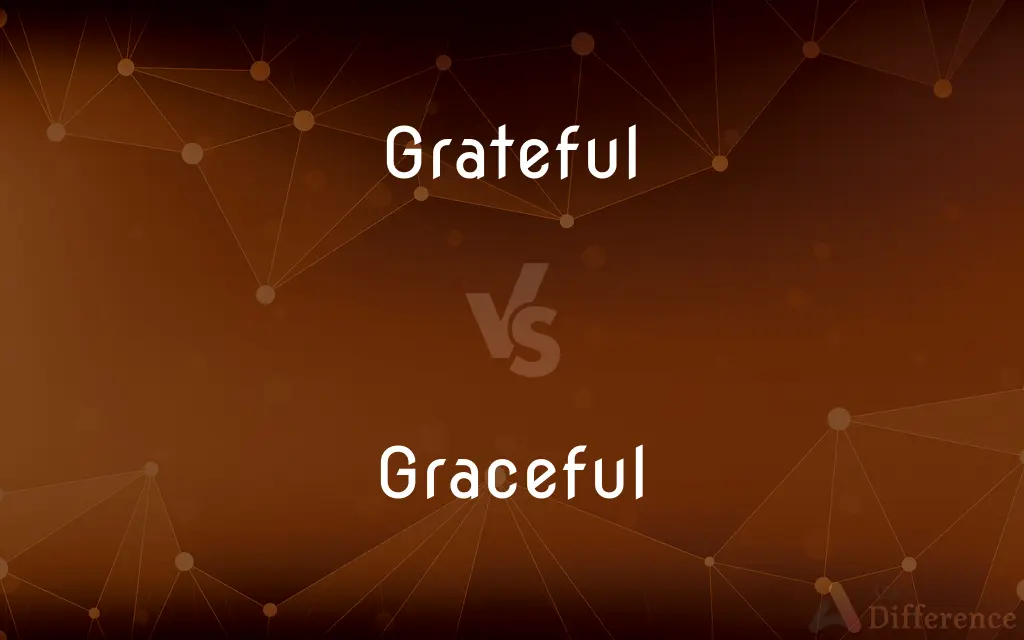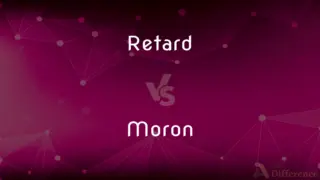Grateful vs. Graceful — What's the Difference?
By Tayyaba Rehman & Maham Liaqat — Updated on March 7, 2024
Grateful and graceful convey distinct qualities; the former pertains to thankfulness, while the latter describes elegance.

Difference Between Grateful and Graceful
Table of Contents
ADVERTISEMENT
Key Differences
Gratefulness is a feeling of appreciation or thanks towards someone or something for the benefits received, often as a result of kindness or generosity. It is an emotional response that acknowledges the positive impact of others' actions on one's life. Whereas, graceful refers to the quality of having a smooth, attractive, and elegant form or manner. It encompasses physical movements, as well as behavior in various situations, suggesting poise and elegance. A ballet dancer, for instance, is often admired for their graceful movements.
Gratefulness is inherently linked to interpersonal relationships and emotional connections. It is a reflection of one's ability to recognize and value the positive aspects of interactions with others, highlighting a sense of humility and appreciation. On the other hand, gracefulness is often associated with physical attributes and aesthetics. It can be observed in the way a person carries themselves, their manners, or in the seamless execution of a particular skill or art form.
While gratefulness is expressed through words, gestures, or actions as a form of acknowledgment or thanks, gracefulness is manifested in the physical realm through one's demeanor, movements, and overall presence. Grateful individuals often express their thanks verbally or through thank-you notes, whereas graceful individuals may captivate an audience with their refined movements or polite conduct.
Gratefulness can be cultivated and nurtured over time through mindfulness and the practice of acknowledging the good in one's life, leading to enhanced relationships and well-being. Conversely, gracefulness can be developed through physical training, such as dance or etiquette classes, and by observing and emulating individuals who embody this quality.
Gratefulness and gracefulness both contribute to the richness of human experience but in different dimensions. Gratefulness enhances one's emotional and social well-being by fostering positive relationships and a sense of contentment. Gracefulness, in contrast, enriches the aesthetic and physical aspects of life, offering beauty and elegance to everyday movements and interactions.
ADVERTISEMENT
Comparison Chart
Definition
Feeling thankful for benefits received
Elegance and smoothness in form or manner
Expression
Through words, gestures, or actions
Through physical demeanor and movements
Associated with
Emotional and interpersonal relationships
Physical attributes and aesthetics
Development
Cultivated through mindfulness and appreciation
Developed through physical training and observation
Impact on life
Enhances emotional well-being and relationships
Enriches aesthetic and physical experiences
Compare with Definitions
Grateful
Feeling thankful for benefits received.
She was grateful for the support from her friends.
Graceful
Moving in a smooth, elegant manner.
The dancer's graceful movements captivated the audience.
Grateful
Appreciative of kindness or benefits.
He felt grateful for the opportunity to study abroad.
Graceful
Exhibiting beauty and elegance in form or action.
Her graceful handling of the situation impressed everyone.
Grateful
Having a thankful disposition.
He's always been grateful for life's small pleasures.
Graceful
Having an elegant and pleasing shape or style.
The vase had a simple yet graceful design.
Grateful
Aware and thankful for good things.
She was grateful for the quiet moments in her busy day.
Graceful
Characterized by finesse and poise.
The figure skater's graceful performance won her the gold.
Grateful
Expressing thankfulness.
They sent a grateful note to their host.
Graceful
Behaving in a polite and pleasant way.
His graceful demeanor made him well-liked by his peers.
Grateful
Feeling or showing an appreciation for something done or received
I'm grateful to you for all your help
She gave him a grateful smile
Graceful
Showing grace of movement, form, or proportion
"Capoeira is a graceful ballet of power and control, artists kicking and jumping in synchronized movement" (Alisa Valdes).
Grateful
Appreciative of benefits received; thankful
I'm grateful for your help.
Graceful
Having or showing grace in movement, shape, or proportion.
She is a graceful dancer.
Grateful
Expressing gratitude
A grateful look.
Graceful
Magnanimous, lacking arrogance or complaint; gracious.
The athlete's graceful acceptance of the controversial second-place finish won the admiration of the spectators.
Grateful
Affording pleasure or comfort; agreeable
Grateful relief from the hot sun.
Graceful
(computing) Gradual and non-disruptive.
Grateful
Appreciative; thankful.
I'm grateful that you helped me out.
I'm grateful to you for helping me out.
Graceful
Displaying grace or beauty in form or action; elegant; easy; agreeable in appearance; as, a graceful walk, deportment, speaker, air, act, speech.
High o'er the rest in arms the graceful Turnus rode.
Grateful
(obsolete) Pleasing, welcome.
Graceful
Characterized by beauty of movement, style, form etc.; not awkward
Grateful
Having a due sense of benefits received; kindly disposed toward one from whom a favor has been received; willing to acknowledge and repay, or give thanks for, benefits; as, a grateful heart.
A grateful mindBy owing, owes not, but still pays.
Graceful
Suggesting taste, ease, and wealth
Grateful
Affording pleasure; pleasing to the senses; gratifying; delicious; as, a grateful present; food grateful to the palate; grateful sleep.
Now golden fruits on loaded branches shine,And grateful clusters swell.
Grateful
Feeling or showing gratitude;
A grateful heart
Grateful for the tree's shade
A thankful smile
Grateful
Affording comfort or pleasure;
The grateful warmth of the fire
Common Curiosities
How can one express gratefulness?
Gratefulness can be expressed through words of thanks, gestures, or thoughtful actions.
Is gratefulness an emotion?
Yes, gratefulness is an emotion that involves feeling thankful and appreciative.
Is it important to be grateful?
Being grateful is important as it fosters positivity, strengthens relationships, and enhances well-being.
What does being graceful mean?
Being graceful means moving or behaving in a smooth, elegant, and attractive manner.
How does gratefulness affect relationships?
Gratefulness strengthens relationships by building mutual respect and appreciation among individuals.
Can gracefulness be learned?
Yes, gracefulness can be learned and improved through practice, such as in dance or etiquette training.
Can someone be both grateful and graceful?
Yes, a person can embody both qualities, feeling thankful in their relationships and interactions, and moving or behaving elegantly.
Can gratefulness be a habit?
Gratefulness can become a habit through regular practices like keeping a gratitude journal or expressing thanks daily.
What does being grateful mean?
Being grateful means feeling or showing appreciation for something done or received.
Can gratefulness impact mental health?
Yes, practicing gratefulness can positively impact mental health by increasing happiness and reducing stress.
Is gracefulness only physical?
While gracefulness often refers to physical movements, it can also encompass behavior and manners.
How does gracefulness affect perception?
Gracefulness can positively affect perception by making an individual appear more poised, confident, and attractive.
Why is gracefulness admired?
Gracefulness is admired because it represents elegance, control, and aesthetic beauty in movement or behavior.
How does culture influence perceptions of gracefulness?
Cultural norms and values can shape what is considered graceful in terms of movements, behaviors, and aesthetics.
Are there exercises to become more graceful?
Yes, activities like ballet, yoga, and martial arts can improve gracefulness in movement.
Share Your Discovery

Previous Comparison
Cat vs. Catfish
Next Comparison
Retard vs. MoronAuthor Spotlight
Written by
Tayyaba RehmanTayyaba Rehman is a distinguished writer, currently serving as a primary contributor to askdifference.com. As a researcher in semantics and etymology, Tayyaba's passion for the complexity of languages and their distinctions has found a perfect home on the platform. Tayyaba delves into the intricacies of language, distinguishing between commonly confused words and phrases, thereby providing clarity for readers worldwide.
Co-written by
Maham Liaqat












































